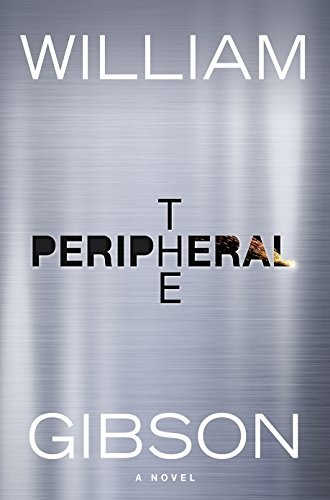4thace reviewed The Peripheral by William Gibson
Review of 'The Peripheral' on 'Goodreads'
4 stars
I read this book in hardcover format, nearly five hundred pages in all. Once I got past the setup in the first third of the book, I found it absorbing and entertaining. It had been a few years since I'd read any of his books and was on board with his shift over his career toward more social and economic topics in his stories. This one is set in two time periods, one relatively near and recognizable as rural America and the other set in London at a much later stage technologically and socially. Through a method mysterious to all the characters, there is a way to transfer information between the two time streams, including sensory and motor nerve impulses in a kind of telepresence connection. There is a rampant faceless capitalism in each and advanced military prowess in both as compared to our state of affairs, though imperfectly controlled by the central government in the near time stream, and not at all controlled by elected governments in the other.
The most effective way those in London timeline can change events in the other one is to inject large amounts of money into it using the link between them, manipulating financial markets. The trouble is that there is another organization attempting to do the same thing and supplementing their efforts with acts of violence. Both sides are essentially amoral, though we are led to understand that the group working with our viewpoint characters is trying to change events in order to avoid the global societal collapse which already happened in the other timeline. The idea is that the collapse of civilization is something that has already progressed too far to stop through normal means, leaving only this out of universe intervention to save the day.
The most interesting character is in the London timeline, that of Ainsley Lowbeer, who has the most agency of anyone in the book extending through both worlds. Her command of information, access to the AI oracles crunching the data, and her experience gained through advanced chronological age give her the kind of power familiar to us from the author's earliest cyberpunk novels. There are a few lines dropped about limits on what she can make happen, but it seems as though it was all Lowbeer's show by the end. Even at the climactic struggle by the main characters we learn that it was what she engineered and not their actions that saved them from death. Maybe using these other characters to accomplish her goals was to her mind the easiest way to bring them about, but I think this choice introduces some problems telling the story.
The author has a way with entertaining, frequently baffling, dialogue. He is fond of having characters talk about disturbing and sometimes horrifying topics alongside jokes and other nuggets of characterization. As for setting, Gibson finds places and environments that interest him and thinks of characters who would thrive in those locations, however outlandish their adaptations turn out to be. The bad guys suffer by comparison from having less attention paid to their habitats than our crew so they come off mainly as degenerate places of chaos. What is more sympathetic, a sparkly office tower or the sushi place and burrito breakfast joint the near timeline characters patronize? So it's hard to see the villains as more than artificial beings themselves, even by the characters in the story, who react with detachment when they are threatened with some messily painful fate. Maybe this kind of stoicism is just the way the author imagines everyone, unless they're jacked up on drugs or something, they don't seem to be at the mercy of their base emotions ever.
This kind of book isn't for every reader. There are no quick payoffs, and while the chapters are short you can get the feeling that you aren't getting anywhere and that you've lost too much of the thread. For me it was worth its imperfections and contrivances to see what felt like a truly new future vision

